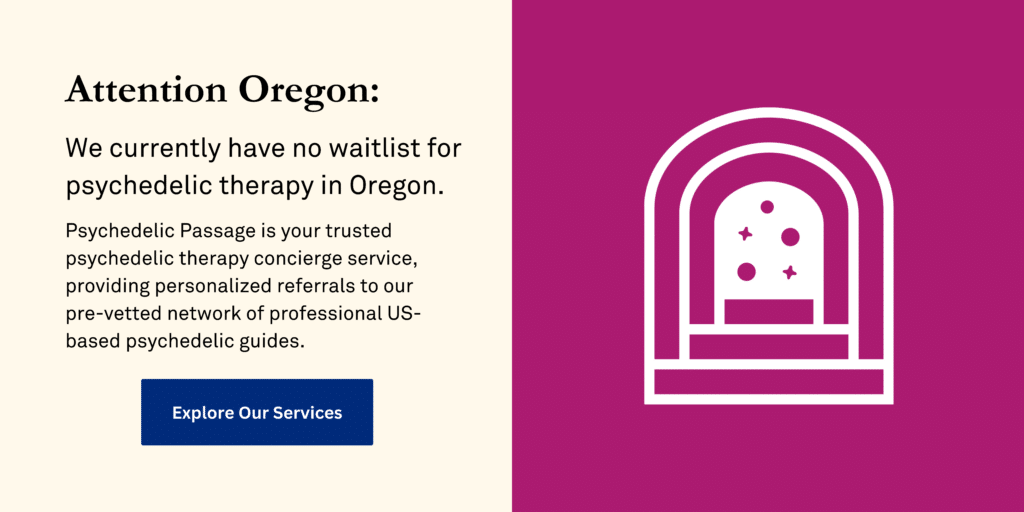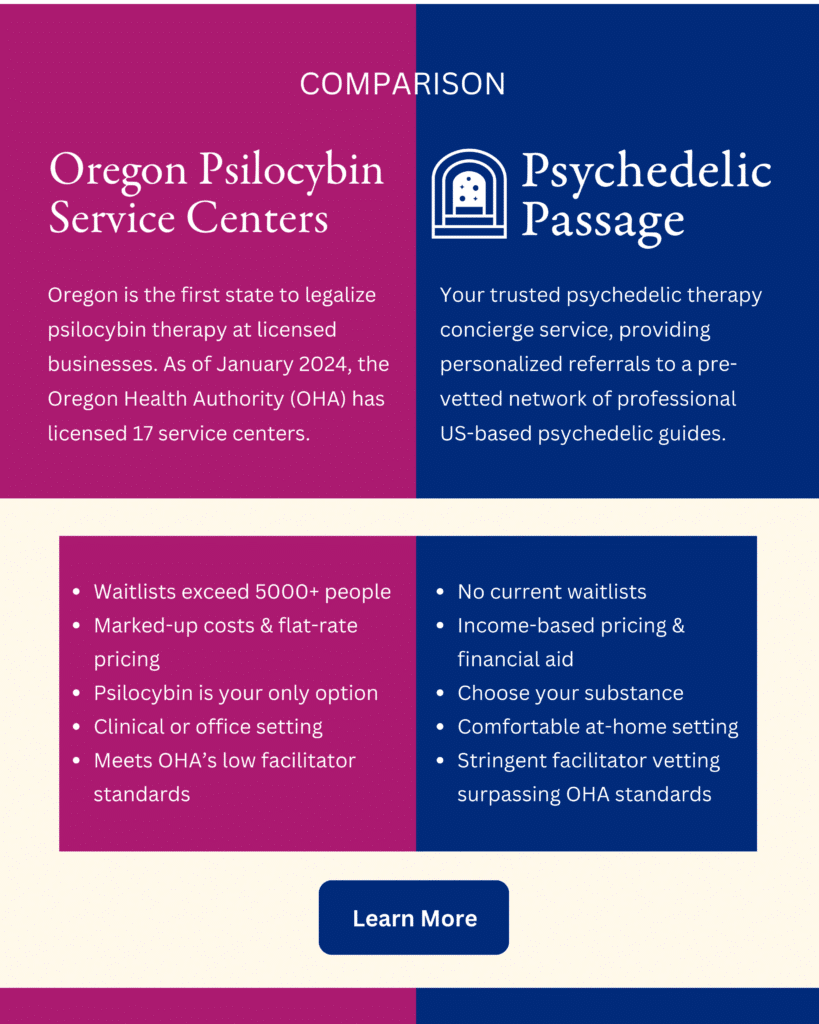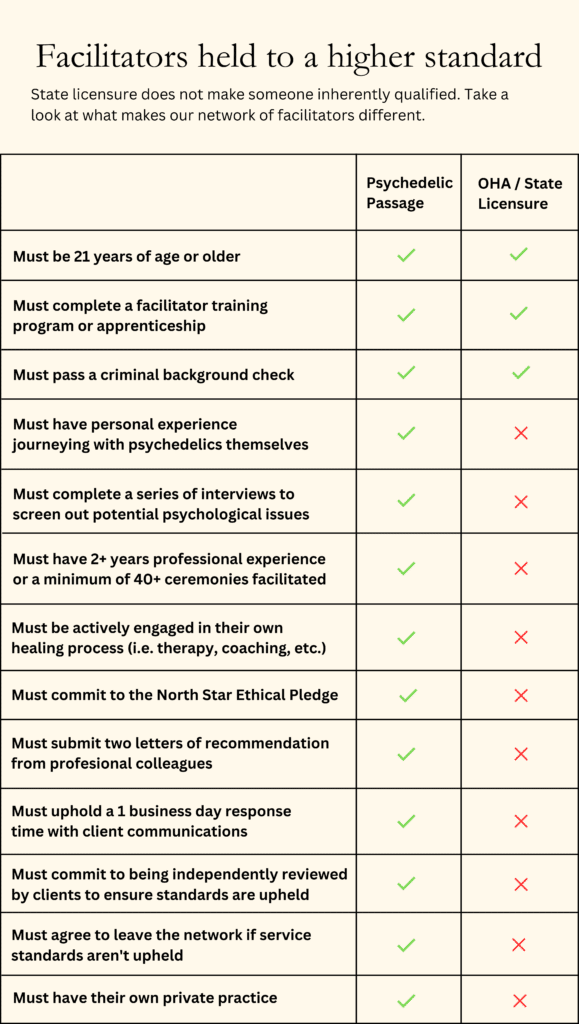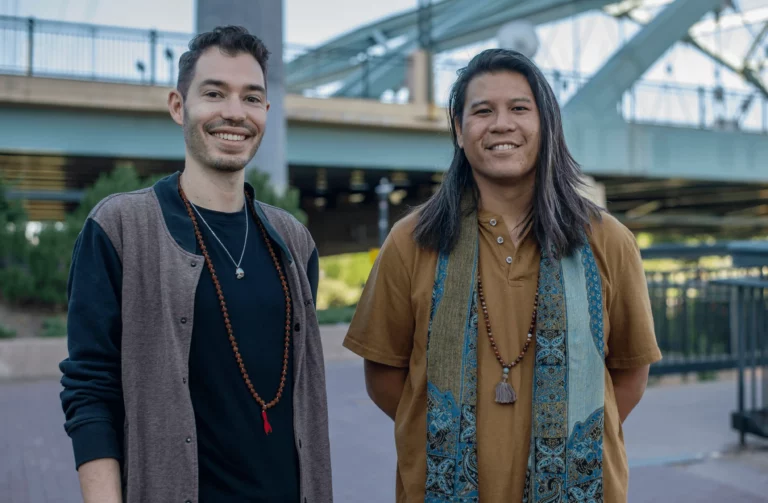Oregon’s recent policy shifts have propelled the state into the forefront of progressive mental health care, notably with the passage of the Oregon Psilocybin Services Act. This groundbreaking legislation paved the way for regulated medical use of psilocybin.
Oregon’s pivotal measures not only recognize the therapeutic potential of psychedelics but also represent a broader shift in drug policy, emphasizing harm reduction and therapeutic interventions over punitive measures.
In the summer of 2023, Oregon saw the opening of the country’s inaugural psilocybin service centers, operating under the new laws instituted by Measure 109. However, this surge in interest has introduced challenges, particularly with extended waitlists and accessibility concerns.
This article delves into the complexities surrounding Oregon’s evolving psychedelic landscape, addressing issues like prolonged wait times, affordability, low licensure qualifications, and the practical limitations imposed on the psychedelic experience.
We also cover how to overcome these barriers when seeking psychedelic therapy in Oregon so that you can find the support you need for affordable and high-quality psychedelic guidance.
Key Takeaways
- Oregon’s psilocybin therapy service centers are grappling with excessively long waitlists, hindering timely access to transformative treatments for individuals in need.
- Beyond wait times, the prohibitive costs associated with state-licensed service centers pose a significant barrier to individuals seeking psilocybin therapy.
- Psychedelic Passage emerges as a viable alternative, addressing the challenges posed by Oregon’s regulatory model, with no wait times, affordable pricing, and higher standards for facilitators.
- Psychedelic Passage: Your Psychedelic Concierge — The easy, legal way to find trustworthy psilocybin guides, facilitators and psychedelic-assisted therapy near you in the United States.
Download Our Free Psilocybin Sourcing Guide
For harm-reduction purposes, we provide links to online psilocybin vendors, local stores, delivery services, and spore vendors for growing your own medicine at home.
What You Need to Know About Oregon’s Psilocybin Therapy & Service Centers
Oregon’s legal landscape underwent a transformative shift with the passage of two pivotal measures, notably Measure 109—the Oregon Psilocybin Services Act—and Measure 110, which softened pre-existing, harsh penalties for certain drug possession and offenses.
Enacted in November 2020, this measure laid the foundation for the regulated medical use of psilocybin, signaling a progressive approach to mental health care.
The summer of 2023 marked a crucial milestone in Oregon’s journey towards psychedelic integration. This period witnessed the opening of the country’s first psilocybin service centers, operating under the new laws instituted by Measure 109.
These licensed service centers represent a groundbreaking development, providing a regulated environment for psilocybin-assisted therapy conducted under the professional supervision of licensed facilitators.
It is essential to recognize that these licensed facilitators, a select group in the nation (alongside those in Colorado), hold the exclusive legal authority to possess and administer psilocybin.
This legal framework positions Oregon as a trailblazer in progressive mental health care, acknowledging the therapeutic potential of psychedelic substances in addressing a spectrum of mental health conditions.
Currently, Oregon’s waitlists have surged to levels of up to 5,000 people in some cases. With 21 service centers open to the public as of January 2024, access around the state is already limited, and in conjunction with these wait times, accessibility is proving to be a real problem.
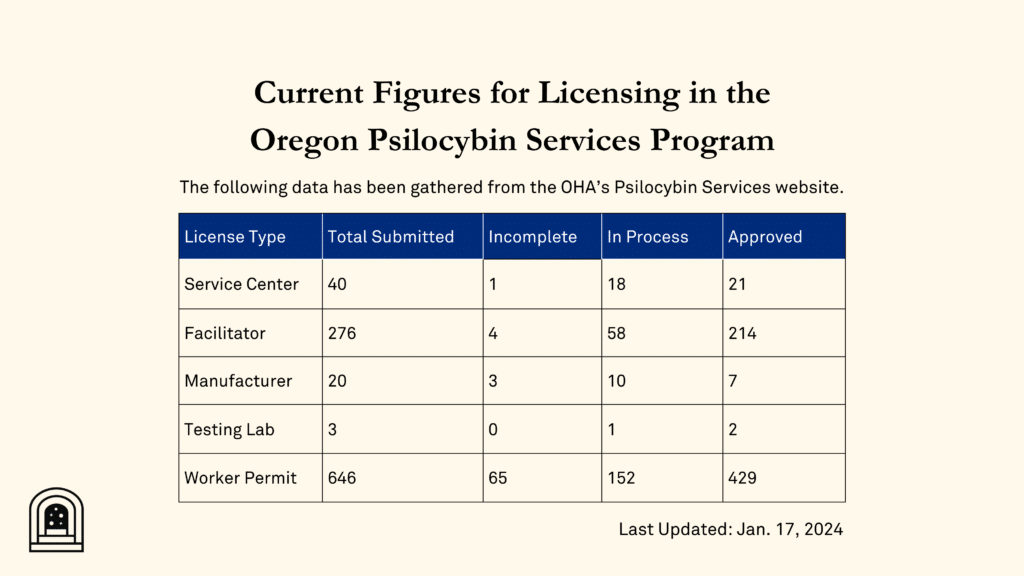
While not all service centers have overwhelming waitlists in the thousands, the high demand and low supply mean that it is still a wide reaching problem that affects every potential journeyer in the state.
This problem not only obstructs general access to these transformative treatments but also poses potential risks for those urgently seeking psychological support and for those who have had limited success with traditional therapies and are in dire need of alternative options.
The gravity of this delay becomes even more pronounced considering that individuals turning to psilocybin therapy often do so in the midst of mental health crises that demand prompt attention, making a wait time of a year or more completely unrealistic.
Conditions like depression, anxiety disorders, and PTSD require timely interventions, and prolonged waitlists in the psilocybin therapy domain hinder individuals from promptly accessing relief.
How to Bypass Waitlists for Psychedelic Therapy in Oregon
For those residing in or planning to travel to Oregon for psilocybin therapy but are finding too many barriers to get in with a service center, there are other more accessible, affordable, and high quality options available to you.
We at Psychedelic Passage are an alternative option for those seeking to have a therapeutic psychedelic experience in a supported and intentional way without the extensive wait times and disadvantages that accompany going through a state-regulated service center.
Our primary goal is to connect psychedelic seekers with our network of intensively vetted and highly qualified psychedelic facilitators, and our standards actually transcend those required by the Oregon Health Authority for state-licensed facilitators.
Not only do we offer our services for those residing in the state of Oregon—where we currently have no waitlists—but our network also extends all across the country and in nearly every state.
Getting started is as simple as booking a call with our concierges to be seamlessly connected with our network of facilitators, offering a pathway to transformative psychedelic experiences without the constraints of prolonged wait times.
Other Things to Consider When Planning a Therapeutic Psychedelic Journey in Oregon
Aside from the prevalent issue of waitlists are several other factors which journeyers should be aware of when navigating the world of service centers, and this may help you better plan your experience.
Facilitation Licensure Qualification
One of the most pressing concerns is the surprisingly low standards for facilitation licensure qualification under the OHA, which we below pose risks for journeyers in the state.
As of now, the only requirements to become a facilitator are to be over 21, a resident of Oregon, a high school diploma, the passing of a background check, and the completion of the state’s training program and exam.
Personal & Professional Psychedelic Experience
Notably, something not included in these requirements is any need for personal or professional experience with the medicine, meaning that according to state requirements, you could pair with a facilitator who has never taken psychedelics themselves nor has ever actually sat for someone on psychedelics.
Imagine sitting down for a meal—would you feel comfortable if the chef had never tasted the dish they’re serving? Now, consider if this dish could profoundly shift consciousness, potentially exacerbating mental health conditions, causing derealization, or retraumatization.
A short course and the passing of a simplistic exam doesn’t exactly qualify nor prepare someone for the delicate territory of the brain on psychedelics and mental health conditions or complications which could arise during the trip.
Myths Surrounding Licensure
Furthermore, a common misconception is that a “licensed facilitator” means you are working with a proper licensed therapist, but this is not a requirement for getting the licensure as a psychedelic facilitator. Cumulatively, these factors are concerning for journeyers who may need more qualified support.
We want to clarify that our concern is not aimed at crediting the value of a facilitator to mental health licensure. In fact, not all facilitators in our network are licensed therapists; some are psychedelic retreat facilitators, integration coaches, or recovery counselors.
Proficiency varies across all professions, and the same holds true for licensed therapists. Just as there are excellent and mediocre doctors despite having a medical license, mental health licensure doesn’t automatically translate to effective facilitation skills.
Our primary concern lies in the absence of crucial barriers and qualifications within the Oregon Health Authority program for psychedelic facilitators.
Treatment Cost
Other problems which are worth considering are the high costs for treatment—which range anywhere from $1,500 for very minimal accommodations to $10,000 for more desirable packages.
According to the OHA, one or two preparation sessions and one integration session are required to be included in any package offered at service centers, with the usual option of additional fees for additional support sessions.
Furthermore, options at the low end of the pricing bracket appear to have very minimal and potentially unideal setting features, with little to no access or visibility to outside or nature, small spaces, few comfort items, and limited access to food.
Autonomy Over Psychedelic Substance & Dosage
Other limitations include not being able to choose what substance you want to take (centers are prohibited to administer anything beyond the Psilocybin Cubensis mushroom strain), a cap on the max dose you can take, and the inability to journey in the comfort of your own home.
Psychological Evaluation
The regulatory framework under the Oregon Health Authority does not mandate a psychological evaluation or human interview as part of the licensure process, potentially overlooking crucial elements in assessing a facilitator’s readiness.
Facilitator Accountability
It’s also important to be able to differentiate and vet both the service center and individual facilitator separately, because reviews may be conflated. It is crucial for journeyers to consider the reputation and qualifications of both when seeking treatment.
Lastly, The OHA program lacks transparency in the process for investigating complaints against facilitators, raising questions about accountability and resolution mechanisms.
Our High Standards at Psychedelic Passage
Having said all of this, it is not our intention is not to demonize Oregon’s centers. The reality is that most of the 715 individuals who availed themselves of regulated services last year likely experienced some form of benefit or positive support.
However, as we begin to observe the consequences of current standards, our responsibility is to educate where awareness is lacking. We sincerely applaud Oregon for pioneering standards in psychedelic therapy, becoming a guiding force for others.
But celebrating milestones should not overshadow the need for conversations about areas that need improvement—areas we, ourselves, have addressed and enhanced. Our aspiration is for the entire industry to evolve into an ethically competitive space.
We have genuine hopes for improvement in Oregon’s regulatory framework, seeing them as a potential proof-of-concept for broader adoption of psychedelic therapy in the US.
We believe this will require open dialogue, constructive critique, and collective efforts to elevate standards. That is why we will persist in educating the public about our services, enabling them to understand the industry’s pitfalls by comparing them to higher standards.
For comparison, when you book a call with us, you gain access to a higher standard and quality of services and resources, which we will outline below:
-
- Immediate access with no waitlists in the state of Oregon
-
- Affordability and options for financial aid and sliding scale pricing
-
- Continual support from preparation all the way to integration
-
- Guidance and screening to determine if psychedelic use is safe and right for you
-
- More freedom to choose different medicines like LSD, MDMA, and a wider variety of mushroom strains
-
- The ability to journey in the comfort of your own home or at another private location
-
- A reputable and trusted source which holds facilitators accountable and prioritizes your satisfaction
Our network of facilitators is vetted at the highest standards in the industry, with many of them holding licensure as clinical therapists. Our standards go beyond those required by the OHA:
-
- 21 or older
-
- A college degree rather than a high school diploma
-
- Completion of a training program or apprenticeship
-
- Passing of more extensive background checks
-
- Completion of a series of actual interviews with real human interaction and vetting
-
- Extensive first hand experience with psychedelics, both personal and professional
-
- A commitment to prompt communication and support for clients
-
- Professional letters of recommendation
Get Matched with a Trusted Psychedelic Therapy Provider Near You
Hi there! We sincerely hope that you’ve found valuable takeaways that resonate with your current intentions. To explore research-based education, stay updated with psychedelic news, and benefit from practical how-to articles, we encourage you to head over to our resources page.
If you’re seeking personalized advice and are prepared to take the first step toward a therapeutic psychedelic experience, we invite you to book a consultation with our team of experienced psychedelic concierges.
This consultation is more than just a conversation; it’s an opportunity to be matched with a trustworthy local facilitator. You’ll be seamlessly connected to our rigorously vetted network of psychedelic guides, ensuring potential matches align with your needs.
Psychedelic Passage offers confidence and peace of mind by alleviating the burden of having to guess who’s right for you. If you want to discover how Psychedelic Passage can help you, we empower you to learn more about our services and check out client testimonials from those who’ve gone before you.
Your healing path is uniquely yours, and our commitment is to serve you at every juncture. Psychedelic Passage: Your Psychedelic Concierge — The easy, legal way to find trustworthy psilocybin guides, facilitators and psychedelic-assisted therapy near you in the United States.
Learn More About Our Network
Frequently Asked Questions
1. Why are waitlists in Oregon’s psilocybin therapy service centers a concern?
Prolonged waitlists hinder timely access to therapy, particularly for individuals dealing with mental health crises. Immediate support is often crucial, and extended waits may pose risks to those in urgent need.
2. What challenges do Oregon’s Psilocybin Service Centers face?
Oregon’s centers grapple with extended waitlists, affordability concerns, low licensure qualifications for facilitators, practical limitations on the psychedelic experience, and client application complexities, hindering smooth access to transformative therapy.
3. How does Psychedelic Passage address accessibility concerns?
Psychedelic Passage offers alternatives with no wait times, affordable pricing, and higher standards for facilitators, emphasizing inclusivity and accessibility for individuals seeking transformative psychedelic experiences.
4. What sets Psychedelic Passage apart in facilitator standards?
Psychedelic Passage maintains rigorous standards, including extensive personal and professional experience with psychedelics, comprehensive training, background checks, and a commitment to providing accessible and affordable options for transformative journeys.
5. Why is there a surge in interest in psychedelic therapy?
The growing interest is fueled by the potential of psychedelic therapy to offer alternative and effective solutions for mental health challenges, including treatment-resistant conditions like depression, anxiety, and PTSD.
6. What factors should I consider before choosing a psychedelic service provider?
Critical considerations include the setting (clinical or private), the substance offered, wait times, cost, facilitator qualifications, and the level of guidance provided, as each plays a crucial role in shaping the therapeutic experience.
Connect With Psychedelic Passage
-
- Listen to our podcast on Spotify, Apple Podcasts, and iHeartRadio
-
- Subscribe to our Youtube Channel
